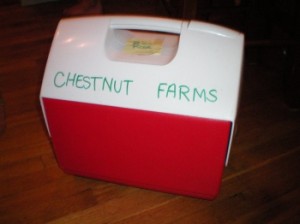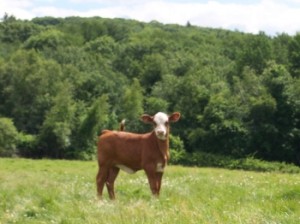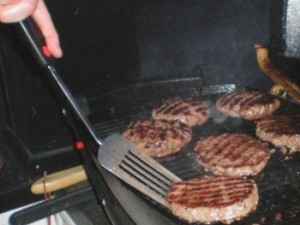 Contributed by guest blogger Katherine Hunt
Contributed by guest blogger Katherine Hunt
It hit 90 degrees here in Boston last week, so we fired up our grills and indulged in some carnivory to celebrate the real beginning of summer. The choicest hamburgers in town came from Chestnut Farms, in Hardwick, Massachusetts.
Green-conscious urbanites can sample fresh, hormone-free meat straight from the country by participating in Chestnut Farms’ Meat CSA (Community Supported Agriculture): pay a monthly fee to help keep the farm’s animals happy and healthy, and pick up a cooler full of the month’s meat selections at one of eight drop-off locations around the state.
You can even meet the animals you’ll later consume – if you’re into that sort of thing – at one of the Farm’s open houses, or at an info session in the Boston area. Brian Rose, who proffered his Meat CSA bounty to this writer, attended a session at MIT before he signed on. “I got to hold a baby pig,” he recalls.
 Brian and Julia, his wife, have a small vegetable garden in their front yard, where they grow tomatoes, lettuce, mint, and other vegetables and herbs. They’re the kind of people, in other words, who want to have a connection with the food they eat. They’d also prefer to buy their meat from a local operation that cares about the well-being of its animals, and, by extension, about the well-being of its customers.
Brian and Julia, his wife, have a small vegetable garden in their front yard, where they grow tomatoes, lettuce, mint, and other vegetables and herbs. They’re the kind of people, in other words, who want to have a connection with the food they eat. They’d also prefer to buy their meat from a local operation that cares about the well-being of its animals, and, by extension, about the well-being of its customers.
Chestnut Farms feeds its cows grass and organic hay, and lets its chickens wander around the pastures, where they can peck at grubs and aerate the soil. The pigs eat grain, not garbage, and even get toys to play with while they’re pent up inside during Hardwick’s icy winters. As a result of this caretaking, the meat that Chestnut’s customers receive has less fat and more nutrients than meat produced by giant industrial farming operations.
 And, just as importantly, the meat tastes better than anything you can buy at a grocery store. Before cooking, our hamburgers looked juicier and denser than their store-bought counterparts. After they had been grilled, they tasted like, well, beef – a flavor that mingled with, and wasn’t overpowered by, the spicy mustard and cheddar cheese that garnished our burgers. The robust meatiness seemed more likely to be found in an unembellished steak, but the buttery texture was characteristic of the best ground beef. These tasty burgers, in the company of spinach salad and cantaloupe sprinkled with mint from the garden, made for a perfect summer meal.
And, just as importantly, the meat tastes better than anything you can buy at a grocery store. Before cooking, our hamburgers looked juicier and denser than their store-bought counterparts. After they had been grilled, they tasted like, well, beef – a flavor that mingled with, and wasn’t overpowered by, the spicy mustard and cheddar cheese that garnished our burgers. The robust meatiness seemed more likely to be found in an unembellished steak, but the buttery texture was characteristic of the best ground beef. These tasty burgers, in the company of spinach salad and cantaloupe sprinkled with mint from the garden, made for a perfect summer meal.
Visit www.chestnutfarms.org for more on their Meat CSA.
Boston-based freelance writer and editor Katherine Hunt may be reached at huntkr@gmail.com.
 From time to time, we find ourselves confronted with an industrial-sized fridge bursting full of vegetables, fruits and dairy leftover from last night’s cooking party.
From time to time, we find ourselves confronted with an industrial-sized fridge bursting full of vegetables, fruits and dairy leftover from last night’s cooking party.



; ?>/img/parties-that-cook-blog-logo.jpg)

